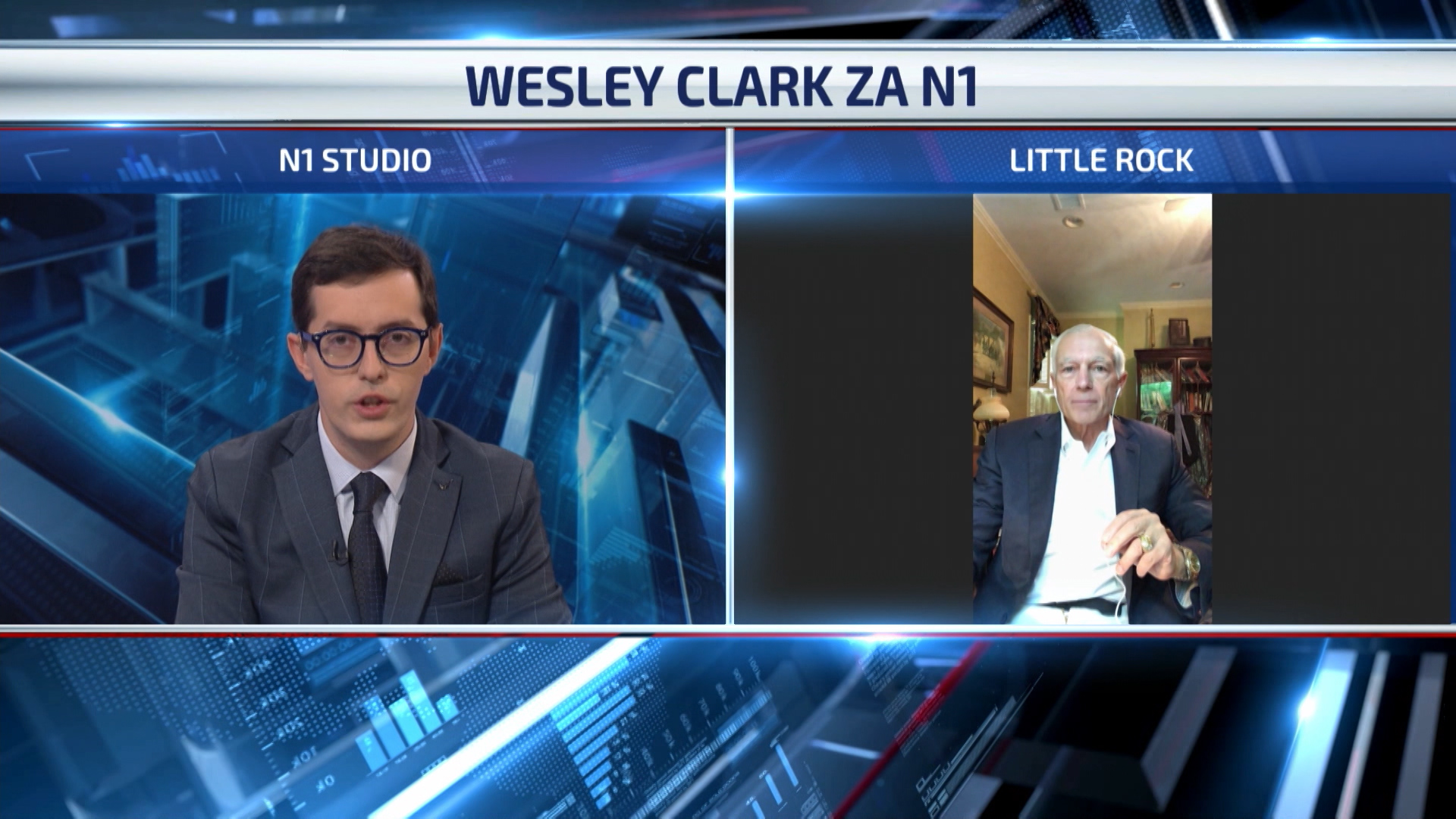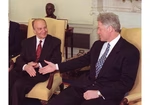
The Western Balkans have an urgent need for economic development and the rule of law, and the US should play a more active role in achieving this goal, former NATO Supreme Allied Commander, Wesley Clark, told N1 in an interview.
“I think there is not much of a chance for a conflict, but I think there are outside powers who are causing stresses, and what we know from history is that Bosnia and the Western Balkans are very fragile,” Clark said, explaining that people in the region have long memories and that, since there was a lot of bloodshed and violence, “tempers can fray very quickly and angry words or hostile gestures can lead to conflict faster in the Balkans probably than anywhere else in the world.”
Some of the “outside forces” present in the Balkans are Russia, Turkey and China, Clark said.
“When foreign leaders run their campaign in other countries, it raises tensions. Turkey and Russia are competing in the Balkans,” he said, adding that this is not only happening in Bosnia, but also in countries like Bulgaria and Romania.
“Then China comes with investment funds, don’t be surprised it those come with conditions. When you bring in Chinese money, you bring in Chinese influence,” he said.
Clark described the Balkans as a place where civilizations have been in conflict throughout history.
NATO is there to ensure military security, he said, while the EU is “designed to promote the welfare of members of the union” and to provide secure economic benefits to the people such as employment.
Other outside powers, like Russia, don’t have such a goal, he said.
“Russia offers nothing like this. Russia is there as a military outlier, wanting to come into the region,” he said.
According to the former NATO General, Russia traditionally approaches the world geo-strategically.
“They see Europe as a chess board, and each country is a square, so they look at each square and they say ‘is this my square or is this your square?’ And then they say, ‘if it’s your square, I want it. If it’s my square, stay out’.” he said.
“And we don’t see the world that way, the whole idea of the 21 century should be that nations work together and they work to make their interests converge, as opposed to trying to compete with each other and trying to advance their own interest at the expense of other nations’ interests,” he said.
Clark was the military advisor to the diplomatic team of former US Assistant Secretary of State, Richard Holbrooke, who was one of those who brokered the 1995 Dayton Peace Agreement which ended the war in Bosnia but also gave the country a complicated political system, creating two semi-autonomous entities in the country - the Serb-dominated Republika Srpska (RS) and the Federation (FBiH), shared by Bosniaks and Croats.
According to Clark, there was “probably no chance to make it less complicated”.
He explained the agreement “came from the previous rounds of negotiation, which was the division of territory based on the facts on the ground. However unpleasant those facts were.”
“People have to learn to work together. We have had enough killing in Bosnia up to that point. I don’t think it was possible to create a unified governmental structure in Bosnia that didn’t recognise the division of territory and the creation of RS. That was simply the facts on the ground and they were accepted, however unjust it was,” he said.
“It’s been 23 years since we’ve signed the Dayton agreement, and a lot of development remains to be done in Bosnia and Herzegovina, and it’s been extremely tough going in my view,” he said.
Clark said that NATO has no specific role in Bosnia today “other than a consultative role”. He said in order to achieve progress in the region, the EU and the US should introduce sanctions to those hindering that progress, and a new High Representative, the top official overseeing the implementation of the Dayton Agreement, should be brought in from the US.
He said the US should get more actively involved because it “had a major part in bringing peace to the region,” but he also explained that “the US can’t fix your country, we’ve proved that in several instances,” naming the cases of Iraq and Afghanistan.
“Nation building actually doesn’t work, what you can do is try to provide the means for the people in the country themselves to promote their security,” he said, adding that the US is already playing an active role active through the US Embassy in Bosnia, which is “trying to engage the various parties within the government in FBiH and RS to do the right thing.”
The members of Bosnia’s tripartite Presidency need to work together, he said, and the two entities need to find a way to agree on common laws and on “steps forward to bring foreign direct investment into Bosnia”.
“All of these delays and these parliamentary roadblocks, and so forth, they don’t help the ordinary people in Bosnia and Herzegovina, they encourage young people to leave,” he said, adding that “people feel like it’s all frozen there”.
“There is no inherent reason why RS and FBiH can’t work together exactly under the framework of the Dayton Accords. But people in RS have long memories, so do people in the FBiH, but let’s get over it,” he said.
“RS is not going to be part of Serbia, it’s part of Bosnia and it has to work together and make things better in Bosnia,” he said, adding that the RS organising joint military training with the Russians only raised tensions and fears.
But, according to Clark, one of the most problematic things that need change in the region is the way public service is viewed.
“One of the things that has happened in all of the states in Eastern Europe, and I include former Yugoslavia among those states, is that, under the the communist system, there was something called ‘nomenklatura’, and if you were a very high official in the Communist Party, you got all the privileges, even though under communism everything notionally belonged to the people,” he explained, adding that top officials of this system would have limousines, drivers and special food and shopping privileges.
In a democracy, that is not the case, he said.
“Under democracy, people receive, when they work for the government, a government salary, and if they are president maybe they have some security, maybe they have a presidential house to live in, but people don’t get wealthy under government service,” he said, adding that “there has been a long term expectation in Eastern Europe that, if they’re elected to high positions, they should live like billionaires (...), have a plane, have special perquisites for investment, have people come to them and give them business deals and so on.”
Public service, he said, is “not a lifetime position, it’s not something that makes you a billionaire, it’s just something you do because you believe in the people, and you believe in the public service.”
“If we could fix one thing in the Balkans, it would be this – that public service is a sacrifice and it’s temporary, and then you go into the private economy and you make all the money you want if you play by the rule of law,” Clark said.
In regard to Serbia-Kosovo relations after Kosovo proclaimed independence, Clark said that “Kosovars have given a lot in this so far and I’m not sure how much more they have to give.”
“So we’re gonna have to see some more movement off the Serb side,” he said.
Kakvo je tvoje mišljenje o ovome?
Učestvuj u diskusiji ili pročitaj komentare





 Srbija
Srbija
 Hrvatska
Hrvatska
 Slovenija
Slovenija



























































